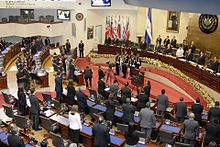The politics of Croatia are defined by a parliamentary, representative democratic republic framework, where the Prime Minister of Croatia is the head of government in a multi-party system. Executive power is exercised by the Government and the President of Croatia. Legislative power is vested in the Croatian Parliament. The Judiciary is independent of the executive and the legislature. The parliament adopted the current Constitution of Croatia on 22 December 1990 and decided to declare independence from Yugoslavia on 25 May 1991. The Constitutional Decision on the Sovereignty and Independence of the Republic of Croatia came into effect on 8 October 1991. The constitution has since been amended several times. The first modern parties in the country developed in the middle of the 19th century, and their agenda and appeal changed, reflecting major social changes, such as the breakup of Austria-Hungary, the Kingdom of Serbs, Croats and Slovenes, dictatorship and social upheavals in the kingdom, World War II, the establishment of Communist rule and the breakup of the SFR Yugoslavia.

Politics of El Salvador takes place in a framework of a presidential representative democratic republic, whereby the President of El Salvador is both head of state and head of government, and of an executive power is exercised by the government. Legislative power is vested in both the government and the Legislative Assembly. The Judiciary is independent of the executive and the legislature. El Salvador was ranked 5th least electoral democratic country in Latin America and the Caribbean according to V-Dem Democracy indices in 2023 with a score of 0.378 out of 1.

The politics of Gabon takes place in a framework of a republic whereby the president of Gabon is head of state and in effect, also the head of government, since he appoints the prime minister and his cabinet. The government is divided into three branches: the executive headed by the prime minister, the legislative that is formed by the two chambers of parliament, and the judicial branch. The judicial branch is technically independent and equal to the two other branches, although in practice, since its judges are appointed by the president, it is beholden to the same president. Since independence the party system is dominated by the conservative Gabonese Democratic Party.
Politics of Guatemala takes place in a framework of a presidential representative democratic republic, where by the President of Guatemala is both head of state, head of government, and of a multi-party system. Executive power is exercised by the government. Legislative power is vested in both the government and the Congress of the Republic. The judiciary is independent of the executive and the legislature. Guatemala is a Constitutional Republic.

Politics of Lithuania takes place in a framework of a unitary semi-presidential representative democratic republic, whereby the president of Lithuania is the head of state and the prime minister of Lithuania is the head of government, and of a multi-party system.

The politics of Mongolia takes place in a framework of a semi-presidential multi-party representative democracy. Executive power is exercised by the government, which is headed by the prime minister. The president is the head of state, but holds limited authority over the executive branch of the government, unlike full presidential republics like the United States. Legislative power is vested in parliament. The judiciary is independent of the executive and the legislature.

Romania's political framework is a semi-presidential representative democratic republic where the Prime Minister is the head of government while the President, according to the constitution, has a more symbolic role, is responsible for the foreign policy, signs certain decrees, approves laws promulgated by the parliament, and nominates the head of government. Romania has a democratic, multi-party system, with legislative power vested in the government and the two chambers of the Parliament, more specifically the Chamber of Deputies and the Senate. The judiciary is independent of the executive and the legislature. From 1948 until 1989, the communist rule political structure took place in the framework of a one-party socialist republic governed by the Romanian Communist Party (PCR) as its only legal party.

The politics of Zimbabwe occurs in a society deeply divided along lines of race, ethnicity, gender and geography. The ZANU–PF party has historically been dominant in Zimbabwe politics. The party, which was led by Robert Mugabe from 1980 to 2017, has used the powers of the state to intimidate, imprison and otherwise hobble political opposition in Zimbabwe, as well as use state funds and state media to advance the interests of the party.

The Dominican Republic is a representative democracy, where the president of the Dominican Republic functions as both the head of the government and head of the multi-party system. Executive power is exercised by the government. Legislative power is vested in the bicameral National Congress. The Judiciary is independent of the executive and the legislature.
The government of Poland takes the form of a unitary semi-presidential representative democratic republic, whereby the president is the head of state and the prime minister is the head of government.
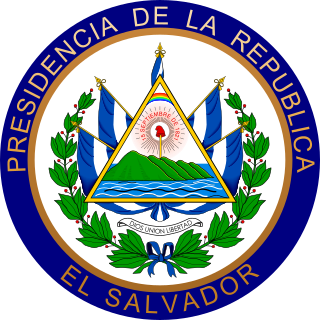
The president of the Republic of El Salvador is the head of state and head of government of El Salvador. The president is also the commander-in-chief of the Armed Forces of El Salvador.

The Nationalist Republican Alliance is a conservative, center-right to right-wing political party of El Salvador. It was founded on 30 September 1981 by retired Salvadoran Army Major Roberto D'Aubuisson. It defines itself as a political institution constituted to defend the democratic, republican, and representative system of government, the social market economy system and nationalism.
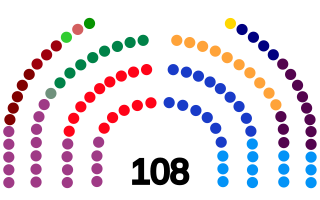
The Congress of the Republic of Colombia is the name given to Colombia's bicameral national legislature.

The government of El Salvador is a presidential representative democratic republic.

The Christian Democratic Party is a Salvadoran political party. From 2011 to 2012, the party was renamed to Party of Hope before reverting to the Christian Democratic Party. The PDC has been led by Reinaldo Carballo since 2023.

The current Constitution of Madagascar was, according to the national electoral commission, endorsed by a majority of voters in the constitutional referendum held on 14 November 2010. The new constitution launched the Fourth Republic of Madagascar and was widely seen as an attempt to consolidate and legitimise the rule of Andry Rajoelina and his High Transitional Authority government which was installed after a military-backed coup d'état against President Marc Ravalomanana at the beginning of the ongoing national political crisis. One substantive change from the constitution of the Third Republic was to lower the minimum age for presidential candidates from 40 to 35. This made Rajoelina, aged 36 at the time, eligible to stand in presidential elections.
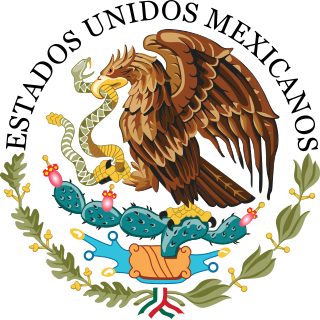
The Federal Government of Mexico is the national government of the United Mexican States, the central government established by its constitution to share sovereignty over the republic with the governments of the 31 individual Mexican states, and to represent such governments before international bodies such as the United Nations.

Presidential elections were held in El Salvador on 3 February 2019, with Salvadorans electing the president and vice president for a five-year term from 2019 to 2024.

General elections were held in Namibia on 27 November 2019. Ballots were cast using electronic voting. A total of eleven candidates ran for the presidency and fifteen political parties contested the National Assembly elections.
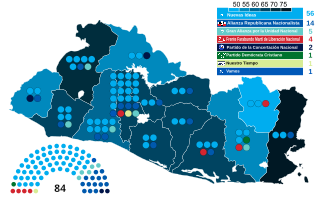
Legislative elections were held in El Salvador on 18 February 2021. Salvadorans elected all 84 deputies of the Legislative Assembly, all 262 mayors of municipal councils of the country's municipalities, and all 20 of El Salvador's deputies to the Central American Parliament (PARLACEN).

